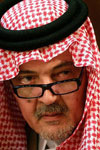 Reuters: Saudi Arabia said on Tuesday Iran’s nuclear programme has increased threats to the Gulf region and urged Tehran to cooperate with world powers to defuse tension after talks last month failed to achieve a breakthrough.
Reuters: Saudi Arabia said on Tuesday Iran’s nuclear programme has increased threats to the Gulf region and urged Tehran to cooperate with world powers to defuse tension after talks last month failed to achieve a breakthrough.
 JEDDAH, Saudi Arabia, June 5 (Reuters) – Saudi Arabia said on Tuesday Iran’s nuclear programme has increased threats to the Gulf region and urged Tehran to cooperate with world powers to defuse tension after talks last month failed to achieve a breakthrough.
JEDDAH, Saudi Arabia, June 5 (Reuters) – Saudi Arabia said on Tuesday Iran’s nuclear programme has increased threats to the Gulf region and urged Tehran to cooperate with world powers to defuse tension after talks last month failed to achieve a breakthrough.
Western nations and Gulf Arab states suspect that the Islamic Republic’s nuclear energy programme is a camouflaged attempt to develop the means to produce nuclear weapons. Iran says it is enriching uranium only for civilian purposes.
“For sure the Iranian nuclear programme has escalated the threat level in the region… So it is dangerous…,” Saudi Foreign Minister Prince Saud al-Faisal told reporters in the Red Sea city of Jeddah after a Gulf Cooperation Council meeting.
“We hope Iran, with all kinds of threats coming from it, changes its policy to protect a region that is Iran’s (as well). I can not imagine Iran becoming the reason for the destruction of this region because it will be the biggest loser.”
Talks last month between Iran and six world powers over its nuclear ambitions ended without an agreement but the sides decided to reconvene in Moscow on June 18-19 in another effort to bridge the longstanding dispute.
“This requires greater cooperation from Iran with the international group,” Prince Saud said. “We hope that Iran stops its nuclear programme and reassures the region’s states.”
Tensions have been on the rise between Shi’ite Muslim Iran and its Gulf Arab neighbours, who accuse Tehran of fomenting Shi’ite unrest in Bahrain and in eastern Saudi Arabia.
Prince Saud also renewed criticism of Iran over what he called its occupation of three strategic Gulf islands that are also claimed by the United Arab Emirates.
“There is a big crisis now in the Gulf caused by Iran’s occupation of the UAE islands and … threats in general,” Prince Saud said.
Friction worsened between Iran and the UAE after Iranian President Mahmoud Ahmadinejad visited Abu Musa, the biggest of the three islands located near key oil shipping lanes at the mouth of the strategic Strait of Hormuz.
Last week, the head of Iran’s elite Revolutionary Guards paid a similar visit to the three islands where he met with military forces stationed there.
Apart from Saudi Arabia, the GCC groups the United Arab Emirates, Qatar, Kuwait, Oman and Bahrain.
(Reporting by Asma Al Sharif; Writing by Mahmoud Habboush; editing by Sami Aboudi and Mark Heinrich)


